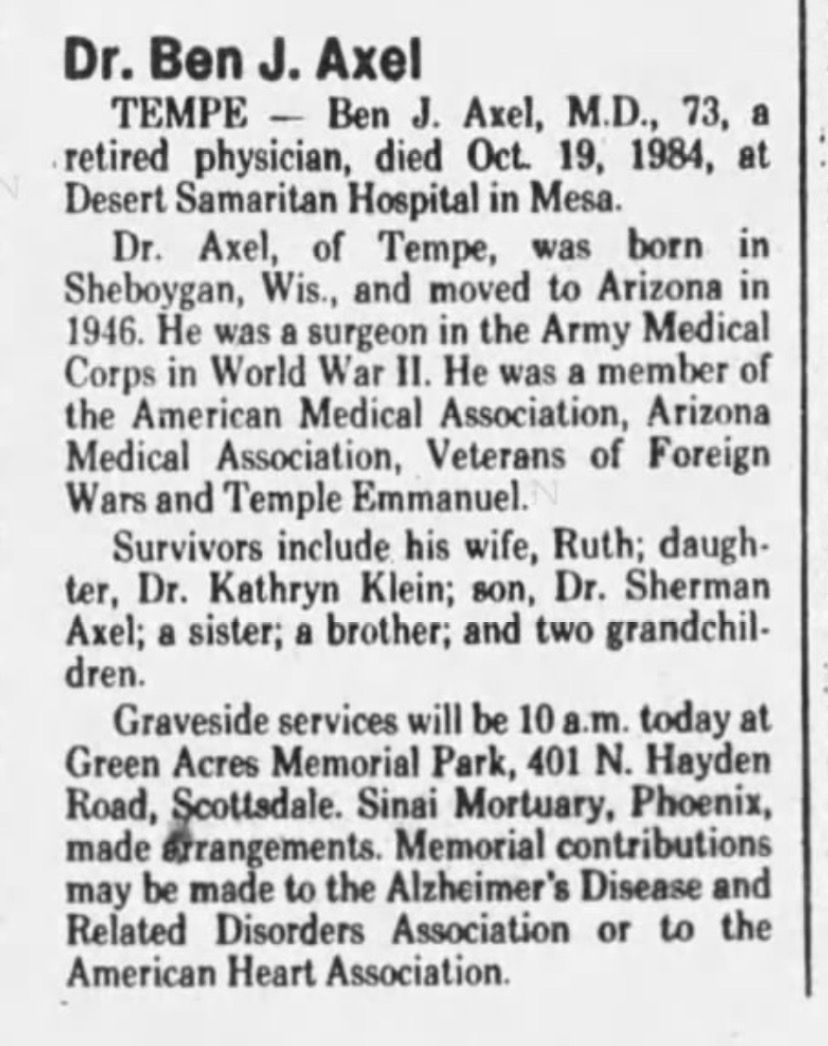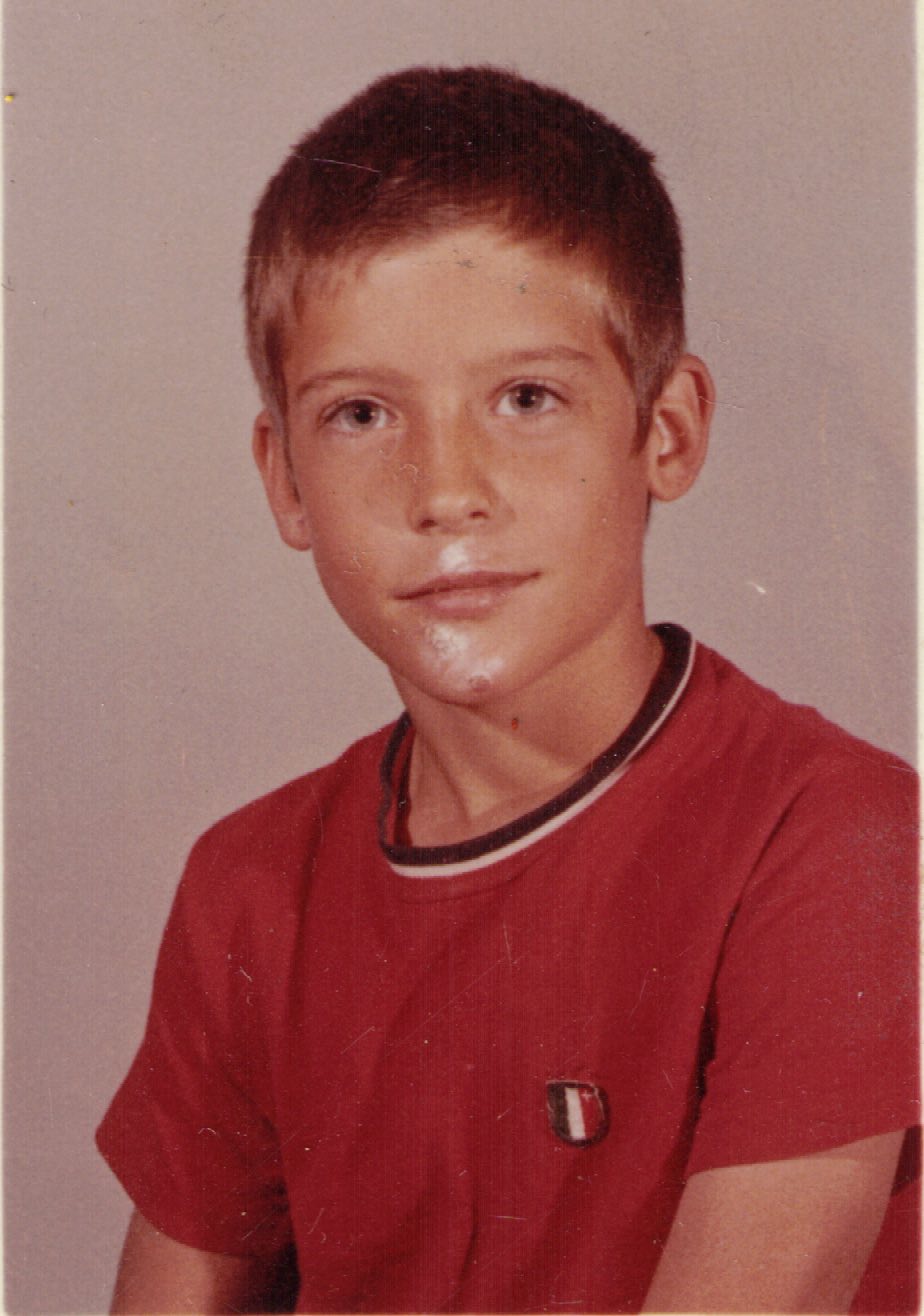Dr. Benjamin Axel
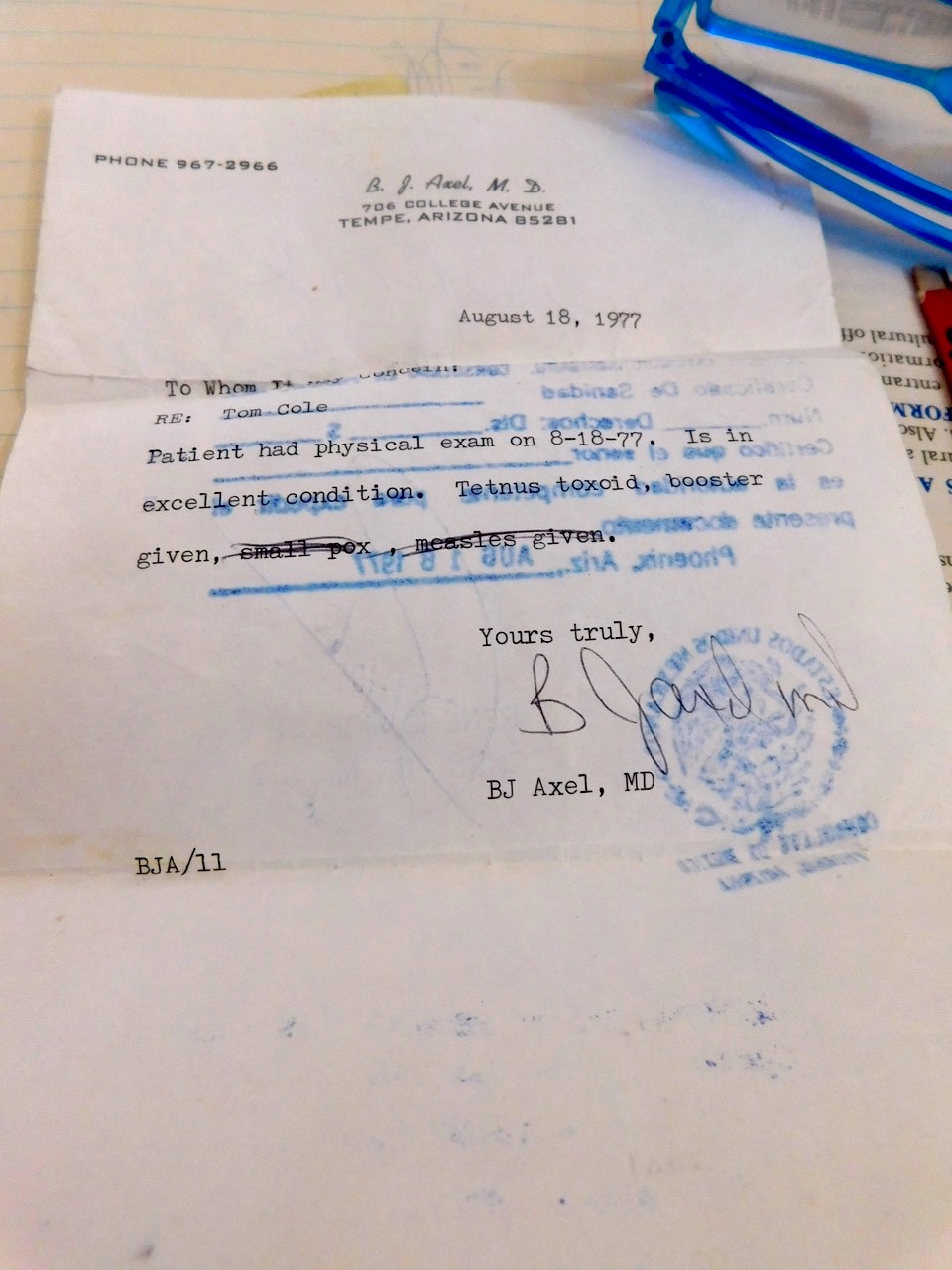
Dr.
Axel Newsletter 1957.pdf
I think Axel told me that he used
to play golf with Barry Goldwater, who would curse a
blue streak.
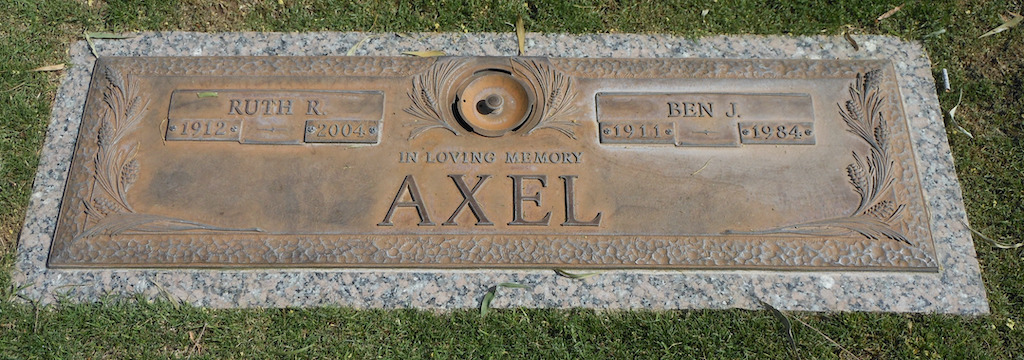
Axel Gravestone.jpeg
18. Dr. Benjamin Axel
background subtle gray weavepng.png
Mi
hermano Jeff me dijo ayer que de joven el doctor
familiar, Benjamin Axel, le había dicho que tenía una
perforación en el tímpano. Mientras la examinaba con
una de esas lupas en forma de embudo con luz, mi
hermano le preguntó refiriéndose a la perforación:
—¿Es seria?
—Pensaba que no —dijo—.
Antes de ver los sesos que se te goteaban de ella.
Tengo mi propia
historia sobre Dr. Axel. Él era cirujano y cuando
teníamos diez años mi hermano gemelo y yo teníamos que
tener las amígdalas quitadas. En aquel entonces el
procedimiento era bastante común y también algo que
hoy yo no recomendaría nunca. Recuerdo como sí fuera
ayer cada detalle de esta experiencia dura y dolorosa.
Había un aspecto positivo, sin embargo.
Resulta que teníamos amigos que habían tenido esta
operación. Todos tenían las amígdalas en pequeños
frascos de vidrio. Yo le había pedido al Dr. Axel que
me guardara las mías y él lo aceptó. Apenas podía
esperar a tener ese recuerdo en una jarra.
La anestesia que usaban en esos días era
éter y para que no le quemara, untaban vaselina en el rostro y encima colocaban toallas
mojadas. Me acuerdo de que yo empecé a oler el vapor
de éter. Fue entonces cuando Axel me preguntó qué
habíamos hecho durante las vacaciones.
—Bueno, fuimos a la playa en Puerto
Peñasco, México, y... —contesté.
No recuerdo otra cosa.
Al recobrar conciencia solamente
podía susurrar un poquito. (No podía hablar por dos
semanas). Dr. Axel me visitó en el cuarto de
recuperación y susurré con dolor:
¿Dónde están mis amígdalas?
Él bajó su cabeza y luego me miró y dijo
pidiendo perdón.
—Tommy, después de la operación me puse
muy pero que muy hambriento.�"
18. Dr. Benjamin Axel
My brother
Jeff told me yesterday that as a youth the family
doctor, Benjamin Axel had told him he had a hole in
his ear drum. While Axel was examining Jeff's ear with
one of those funnel-shaped magnifying glasses with the
light, my brother asked, "Is it serious?"
"I didn't think so
until I saw your brains leaking out of it," Axel
answered.
I have my own story
about Dr. Axel. He was a surgeon and when we were ten,
my twin brother and I had to have our tonsils out.
Back then the procedure was really common and also
something that today I would not recommend. I remember
as if it were yesterday every detail of this painful,
miserable experience.
There was a silver lining, however; it
so happened that we had friends who had had the
operation and they all had their tonsils in glass
jars. I had asked Dr. Axel to save mine and he agreed
to do so. I could hardly wait to have my
souvenir-in-a-jar.
The anesthesia that
they used in those days was ether and in order for it
not to burn you, they spread Vaseline over your face
and put wet towels on top as well. I remember smelling
the fumes. It was at that point that Axel asked me
what we had done over the vacations. �Well," I answered. "We went to the beach in
Rocky Point, Mexico, and..."
That's all I remember.
When I awoke, I could only whisper a
little. (I couldn't speak for two weeks.) Dr. Axel
visited me in the recovery room and I whispered in
pain, "Where are my tonsils?"
He lowered his head and then looked at
me apologetically. "Tommy, after the operation I got
really really hungry."
KOKOPELLI
He was a bent man. Literally. He was stooped over,
cracked like a broken stick, permanently hunched. "If
I take that medicine will it straighten me up?" he
asked.
"No, no, no," replied Dr. Benjamin Axel rather
impatiently. The bent old man was a little senile
perhaps, loquacious, and a bit irritating.
"Well, I'm going to go out and sit under a tree
in the park where it's cool!" he said loudly and
cheerfully.
It was a good idea because that Arizona summer
was a hot one. I was around ten or eleven I think, and
my brother and I were in the doctor's office. He, too,
remembers the bent man.
I'm guessing now that the bent man was
suffering from osteoporosis and it brings to mind
something I recall hearing in an anthropology class.
If I remember right, the professor said that Kokopelli
was of interest to archaeologists because he could be
evidence of tuberculosis in the ancient Southwest as
one sign of tuberculosis is crippling arthritis of the
spine.
KOKOPELLI
Era un hombre doblado. Literalmente. Torcido,
quebrado como un palo verde, jorobado permanentemente.
—¿Si tomo este medicamento me enderezará?
—preguntó.
"No, no, no," respondió el Dr. Benjamin Axel
sin mucha paciencia. El viejo doblado era tal vez
senil, locuaz, y un poco fastidioso.
—Bueno. Ya me voy. ¡Voy a sentarme debajo de un
árbol en el parque donde hace fresco! —gritó
ruidosamente y alegremente.
Fue una buena idea ya que ese verano
arizonense era cálido. Yo tendría alrededor de diez o
once años y mi hermano y yo estábamos en el
consultorio del médico. Él también recuerda al hombre
doblado.
Adivino ahora que el hombre doblado padecía
osteoporosis y me viene a la mente algo que recuerdo
haber oido en una clase de antropología. Si no mal me
acuerdo, el profesor dijo que Kokopelli interesaba a
los arqueólogos porque él podría ser la evidencia de
la tuberculosis en el suroeste antiguo ya que una
característica de la tuberculosis es la artritis
paralizante de la columna vertebral.
THIS IS INCLUDES A TRIP TO AXEL'S OFFICE
20. La mordida
Cuando era niño un perro grande me mordió en el
antebrazo. Me escondí porque el corte era bastante
grande y yo creía que necesitaba puntos. No quería ir
al médico.
Mis padres vieron gotas de sangre en la casa y
lograron encontrarme al seguir el rastro de
sangre en la casa.
Me llevaron al médico. La enfermera era una chica
mexicana/norteamericana. Le pregunté:
—¿Cree Ud. que voy a necesitar puntos?
—Generalmente, el doctor no sutura mordidas de
perro.
Tenía razón.
Un poquito más tarde el perro mordió a otro muchacho
y las autoridades lo sacrificaron.
No me dieron puntadas y por eso hoy tengo una
cicatriz en el brazo.
20. The Bite
When I was just a boy, a big dog bit me on the
forearm. I ran and hid because the cut was pretty big
and I thought I would have to have stitches. I
didn’t want to go to the doctor.
My parents saw drops of blood in the house and were
able to find me by following the trail of blood. They
took me to the doctor. The nurse was a
Mexican/American young woman. I asked her, “Do you
think I’m going to have to have stitches?”
“Generally the doctor doesn’t stitch dog bites.”
She was right.
A while later, the dog bit another kid and the
authorities had it put to sleep.
They didn’t give me stitches and so today I have a
scar on my arm.
HERE'S ME WITH A
SALVE AXEL PRESCRIBED ME
Tom I think 5th grade infantigo impetigo.jpg
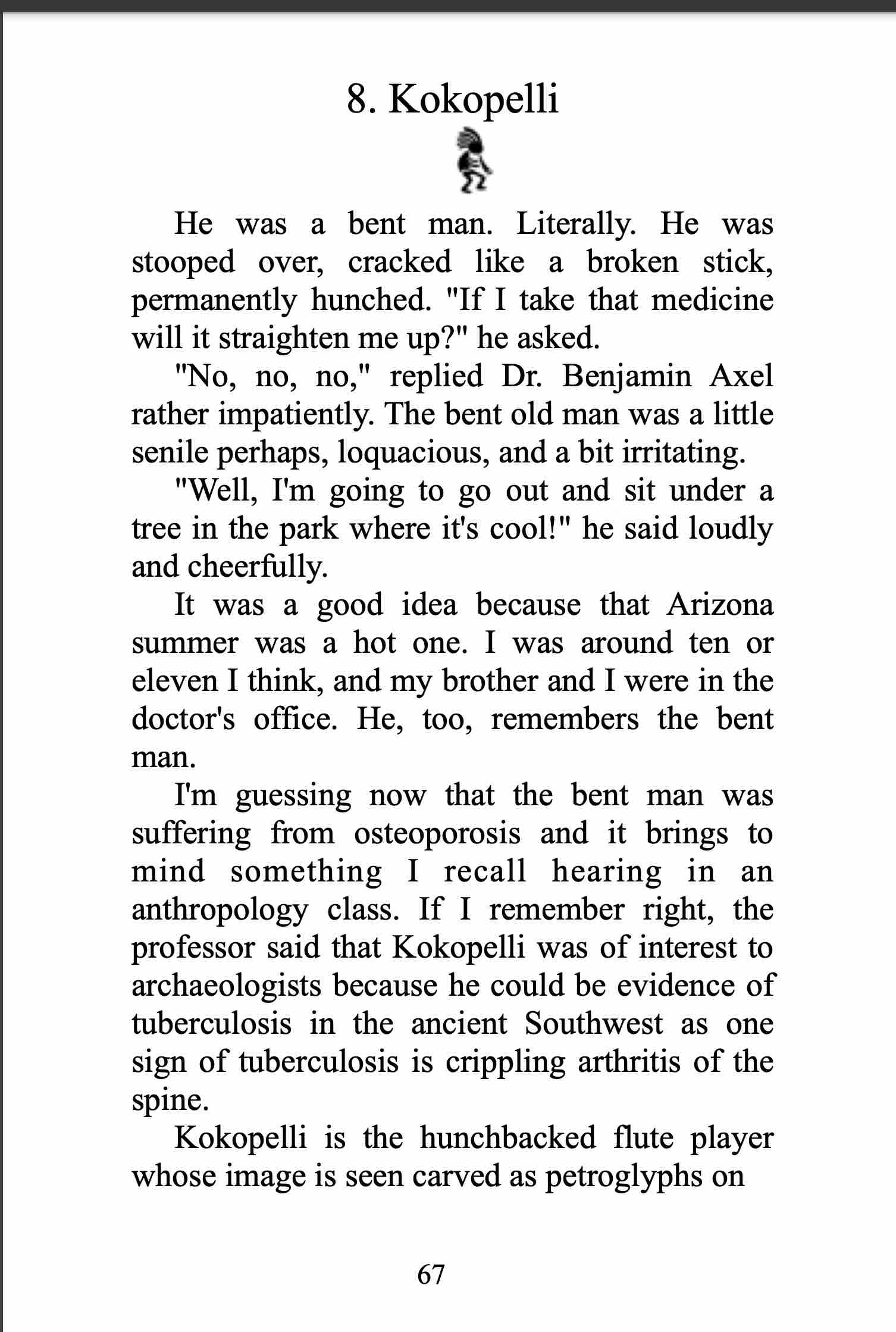
Kokopelli Escrituras 1.jpg
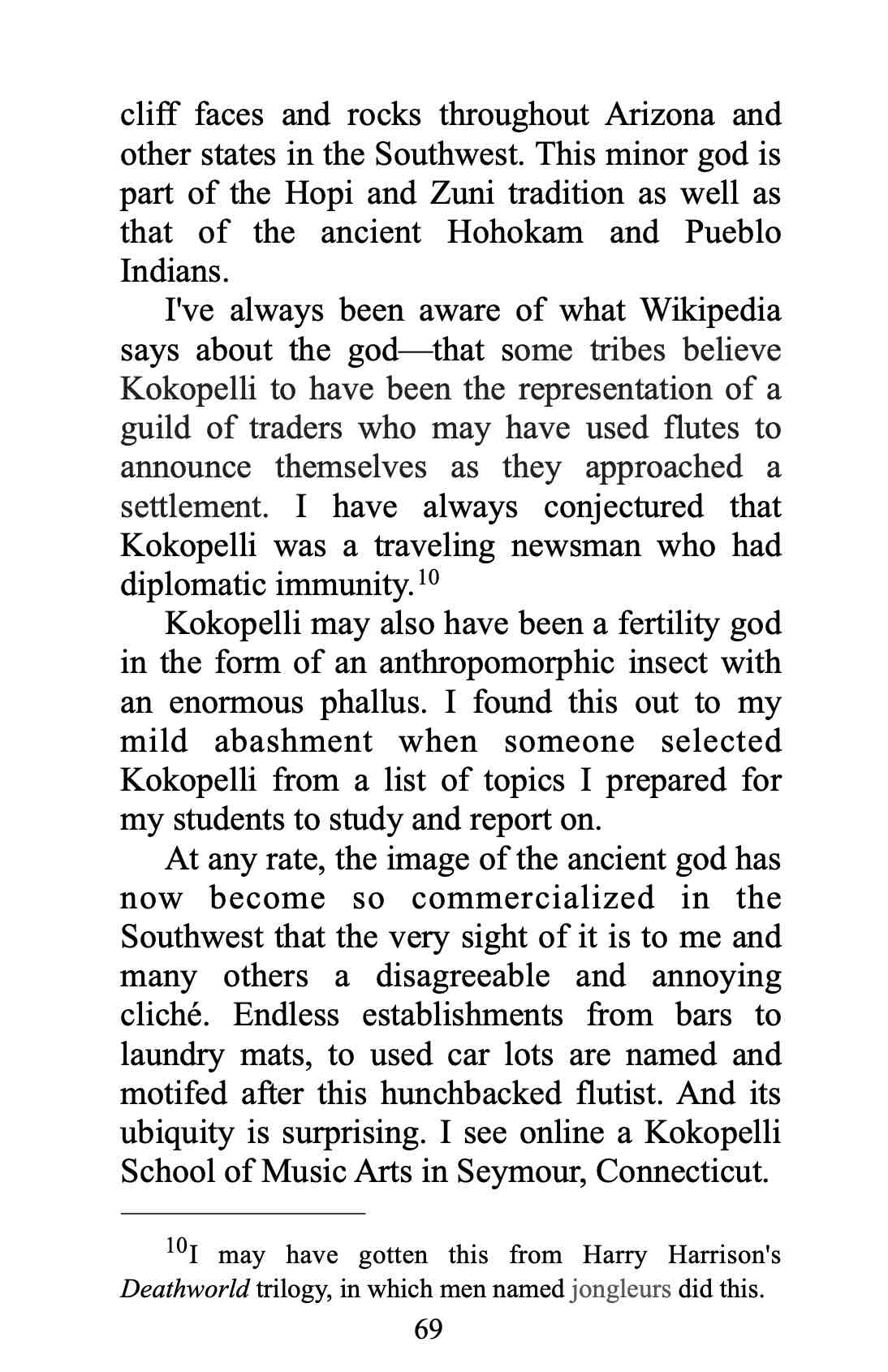
Kokopelli Escrituras 2.jpg
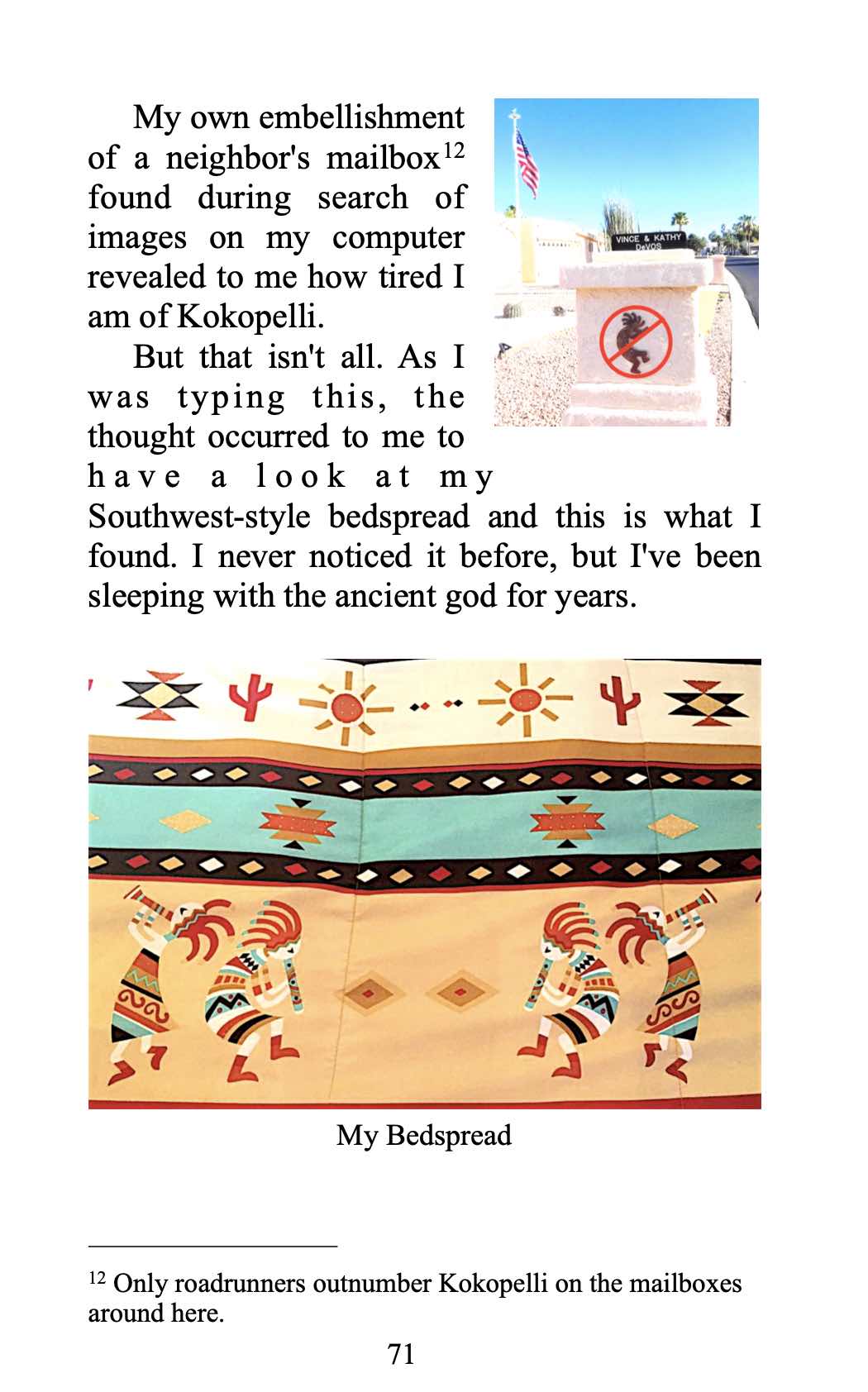
Kokopelli Escrituras 2.jpg
|
|
